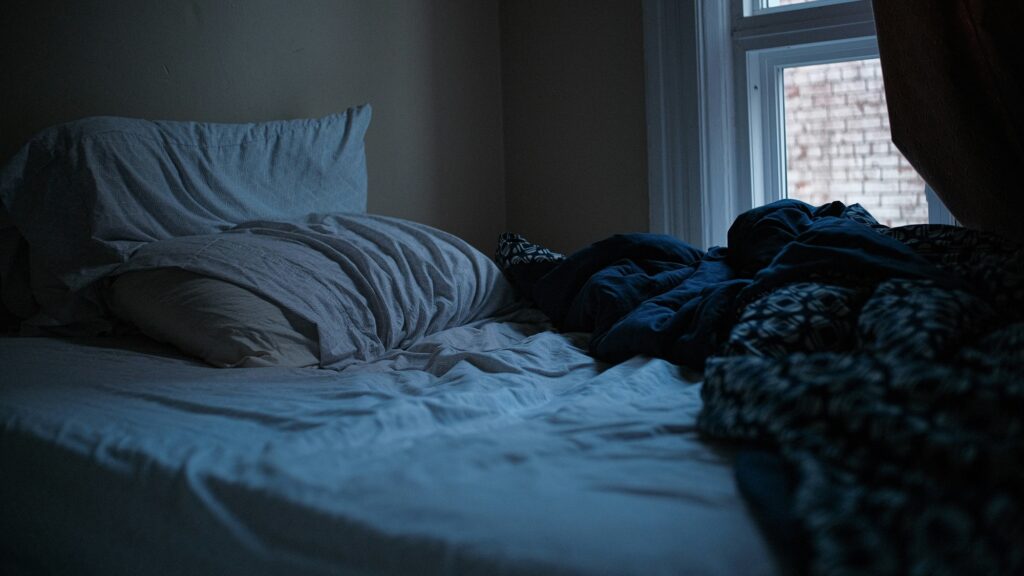Here’s a fun fact. On average, you burn around 50 calories per hour while sleeping.
Even when you’re sleeping, your body is still using energy. Your sleeping metabolic rate (SMR) refers to the rate at which your body is burning calories while you sleep.
In this article, you’ll learn about the surprising relationship between sleep and metabolism.
Your body never stops going. Even when you’re relaxing on the couch or just scrolling through social media, your body is working behind the scenes.
But to carry out all the internal processes going on, your body needs energy. And that energy comes from your metabolism.
Your metabolism is a sequence of chemical processes that converts what you eat and drink into energy that the body uses to function.
Breathing, blood circulation, hormone or blood sugar regulation and the growth and the process of repairing cells rely on the energy provided by your metabolism.
What is sleeping metabolic rate?
Your metabolic rate translates into how fast or quickly your body is able to burn through energy (or calories).
Your body uses energy in four primary ways:
- Energy used at rest: Even when you’re sitting on the couch doing absolutely nothing, your body still needs energy to carry out basic functions, like managing your body temperature, regulating hormone levels, or circulating blood throughout your body. The minimum number of calories your body needs at rest for basic functions like these is called your Basal Metabolic Rate (BMR). Your BMR accounts for roughly 60–80% of your total daily energy expenditure (TDEE). Your TDEE is simply how many calories you burn per day, and it takes into account how much you exercise. The typical BMR for a healthy woman is around 5,900 kJ per day (roughly 1,400 calories) and for men, it’s approximately 7,100 kJ per day (roughly 1,700 calories). You might often see BMR and RMR (Resting Metabolic Rate) used interchangeably.
- Energy used to break down food: It takes energy for your body to break down food, and your body burns calories while doing it. The process where your body breaks down food for energy is known as the thermic effect of food. This accounts for roughly 10% of the energy used.
- Energy used for activity: This component is the one that can fluctuate the most. Your activity energy expenditure (AEE) can be divided into two categories: exercise and non-exercise activity thermogenesis (NEAT). Your AEE is responsible for about 10–30% of your energy expenditure each day. NEAT is everything you do that isn’t directly related to exercise. For example, cooking, or even taking the stairs at work instead of the elevator, all fall under NEAT.
- Sleeping metabolic rate: Burning calories while you sleep depends on your SMR, which refers to the energy used while sleeping.
Before we delve into the metabolic processes that occur during sleep, let’s acquaint ourselves with the determinants of sleep.
The sleep-wake cycle
The sleep-wake cycle is determined by three main elements:
- Circadian rhythms: A circadian rhythm or circadian cycle refers to an internal process that modulates the sleep-wake cycle and recurs roughly every 24 hours. When everything is in working order, a circadian rhythm promotes quality sleep. However, when this circadian rhythm is disrupted, it can cause sleeping problems, such as insomnia.
- Sleep homeostatic drive: Also known as your pressure for sleep, it increases the longer you stay awake. It decreases while you sleep and comes to a low point after a good night’s rest.
- Emotional/Cognitive processes: These processes play a key role in determining the sleep-wake cycle.
Your body’s master clock, which is made up of about 20,000 nerve cells, is located in a part of your brain called the hypothalamus. Also known as the suprachiasmatic nucleus (SCN), your master clock is responsible for circadian rhythmicity to help you fall asleep. It also impacts endocrine function, food intake, physical activity and metabolism.
Sleep architecture
According to Sleep Disorders and Sleep Deprivation, a book on sleep physiology, the architecture of sleep can be defined as the basic structural organisation of normal sleep.
There are two types of sleep:
- Deep Sleep or NREM (non-rapid eye movement)
- REM Sleep (rapid eye movement)
Your body goes through different metabolic processes during the different stages of sleep.
You enter Stage I and Stage II when you first fall asleep, which are light stages of Deep Sleep. Approximately 20 minutes into your sleep, you will transition into Stage III and Stage IV of Deep Sleep.
70 minutes into your sleep, you will likely find your way into REM Sleep. On average, each cycle of sleep (both Deep and REM) lasts roughly 90 minutes. And you can expect to go through between four and six sleep cycles a night. According to Dr Michael Breus, a sleep specialist, author and expert, ‘glucose metabolism starts to increase in the second half of the night when you enter REM sleep.’
Your metabolism when you sleep: Can you burn calories while you’re asleep?
The short answer to this question is yes—your body is burning calories while you sleep. You burn approximately 50 calories per hour while sleeping.
But the exact amount of calories you burn while sleeping depends on your BMR, which takes into account a variety of metabolic factors, such as diet, exercise, stress management and sleep quality/duration.
To get an exact BMR number, you would need to use a calorimeter, which is an instrument that measures how much energy you consume by looking at oxygen and carbon monoxide levels going into and out of your body.
While a calorimeter is more accurate, using one to calculate your BMR can end up being expensive and typically involves an overnight stay in a laboratory. This isn’t feasible for the average person. Luckily, there is a more practical way to calculate your BMR, and that’s by using the Harris-Benedict equation.
Calculating how many calories you burn while sleeping
Compared to your basal metabolic rate, you burn roughly 15% fewer calories while you sleep.
The calculation to figure out how many calories you burn while sleeping is as follows:
- (BMR/24) x 85%
In this case, they would burn roughly 99 calories per hour.
Increasing your BMR can increase the number of calories you burn while you sleep. This can be done by focusing on ways to optimise your metabolic health, such as glucose control, exercising regularly, eating a well-balanced diet, getting enough sleep, and managing stress.
Burning calories while you sleep: what happens in the body?
Here’s what happens in the body while you’re sleeping:
Your energy expenditure and carbohydrate oxidation begin to slow down as your body begins to work its way through the different stages of sleep. And as your body comes to Stage III of Deep Sleep, your heart and brain activity comes down to minimum levels, which results in a slower metabolism.
It is also during this time that the body releases human growth hormone (HGH). Human growth hormone is made by the pituitary gland. It plays an important role in managing fat, muscle, tissue and bone in the human body. It also impacts different facets of your metabolism, such as insulin action and blood sugar levels, and influences body composition, cell repair and growth. Your growth hormone levels gradually decrease once you hit middle age.
During the second half of the night as your body transitions into REM Sleep, your metabolism starts to rev up.
During REM Sleep, your heart rate, blood pressure and brain activity increase to levels that resemble someone who is fully awake. According to Neurology and General Medicine, 4th Edition, you can think of someone in REM Sleep as having a ‘metabolically awake brain in a paralysed body’.
The elevated levels of brain activity that occur during REM sleep require more glucose, which results in a higher metabolism. In other words, you burn the most calories during REM sleep, as this is when your body goes through the most glucose.
Disruptions to REM sleep can impact the number of calories you burn. But developing good sleep hygiene habits, like limiting blue light exposure before bed, can help you fall asleep fast and get good, quality sleep throughout the night.
You might be thinking that you can just sleep your way to weight loss. Unfortunately, too much sleep can actually have a reverse effect on your metabolism. Sleeping too much can slow down your metabolism due to the fact that laying in bed all day doesn’t expend as much energy as being up and active.
How you can burn calories while asleep
- Don’t eat closer to bedtime and eat smaller meals for dinner: Eating close to bedtime, especially large meals, can make it hard for your body to digest its food and may even slow down your metabolism. Try sticking to smaller, more frequent meals throughout the day. When you consume food closer to bedtime, the growth hormone encourages the storage of food as fat instead of fuel.
- No alcohol/coffee three hours before bed: Caffeine and alcohol may cause a temporary boost to your metabolism but it can also disrupt your sleep schedule. Alcohol prevents you from slipping into the deep sleep stages. As mentioned earlier, glucose metabolism speeds up during REM sleep.
- Exercise: Exercise is a way to help increase your body’s BMR. A higher BMR will help you burn more calories while you sleep. But working out closer to bedtime may not be advisable. Sleep expert Breus explains that exercise can cause the body temperature to rise and make it difficult to fall asleep.
- Sleep in colder temperatures: Sleeping temperature can also have an impact on how many calories you burn while sleeping. When you sleep in a cooler room, your body has to work harder to raise its core temperature to 98.6℉, which is widely considered to be the normal body temperature. This can raise your body’s BMR and help you burn more calories. This mechanism also causes brown fat cells to ask for energy from white fat stores, which reduces the amount of white fat (also known as body fat) in the body.
- Avoid lack of sleep: When you don’t get enough sleep, your body produces more cortisol (a stress hormone), which causes gluconeogenesis (a process that takes non-carbohydrate sources and turns them into glucose). In turn, this negatively impacts your body’s ability to manage its blood glucose. Research has also shown that lack of sleep can increase ghrelin levels in the body (hunger hormone) and decrease levels of leptin (appetite suppressant hormone), which can lead to increased food intake and other medical issues like diabetes or metabolic syndrome.
Numerous other health problems, such as heart problems, obesity, and type 2 diabetes, can also occur. One observational study of over 4,00,000 people found that lack of sleep increases your risk of heart failure. Another study of over 6,000 men and women between the ages of 67 and 99 examined the link between lack of sleep and obesity. For men, the study found that those who got less than five hours of sleep were approximately four times as likely to be obese as those who got between seven and eight hours. The study produced similar results for the women. Those who got less than five hours of sleep each night were about twice as likely to be obese as those who got adequate sleep each night.
Moreover, your immune system can also be negatively impacted by lack of sleep. While you’re sleeping, certain elements of your immune system start to accelerate.
For example, your body produces cytokines, which are proteins that can ward off infection and inflammation. But a lack of sleep weakens the body’s defence system, which makes it harder for your body to fight off germs and disease.
One study even found that those who slept less than six or seven hours each night were more likely to catch a common cold or flu.
According to University of Chicago researchers, not getting enough sleep can also cause you to feel ‘metabolically groggy’. In fact, researchers found that just four days of deficient sleep can cause insulin sensitivity to drop by more than 30%. That’s problematic because when your body can’t process insulin properly, it can raise blood sugar levels and your body can end up storing fat instead of using it for energy.
Conclusion
Even when you’re sleeping, your body is still working behind the scenes to burn calories, especially during REM Sleep when your metabolism revs up. The amount of calories you burn while sleeping depends on your BMR, which you can calculate using the Harris-Benedict equation. Remember that sleep impacts your health in ways that go far beyond burning calories, and developing good sleep hygiene habits will allow you to get the quality sleep you need for good overall health.
Disclaimer: The contents of this article are for general information and educational purposes only. It neither provides any medical advice nor intends to substitute professional medical opinion on the treatment, diagnosis, prevention or alleviation of any disease, disorder or disability. Always consult with your doctor or qualified healthcare professional about your health condition and/or concerns and before undertaking a new healthcare regimen including making any dietary or lifestyle changes.
References







